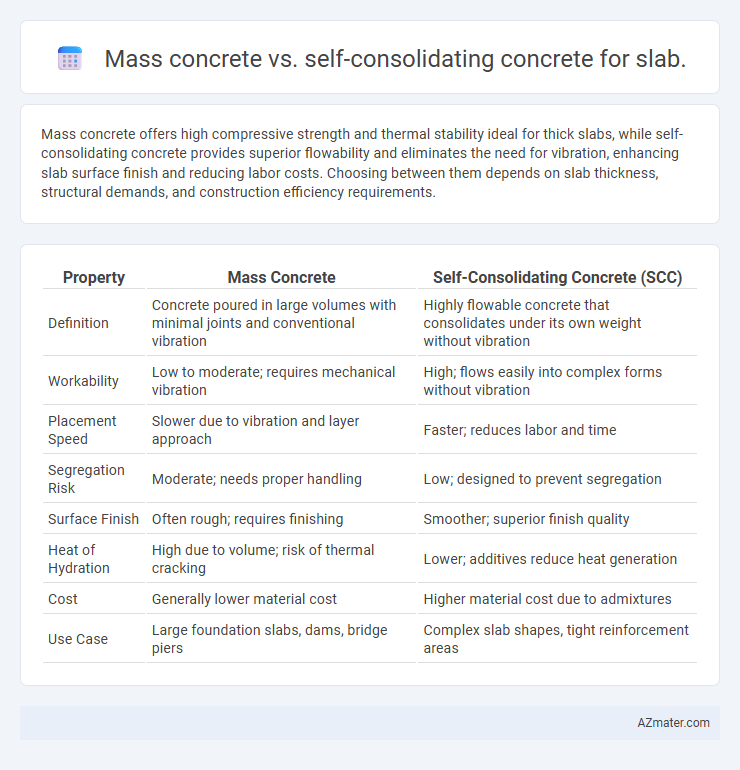Mass concrete offers high compressive strength and thermal stability ideal for thick slabs, while self-consolidating concrete provides superior flowability and eliminates the need for vibration, enhancing slab surface finish and reducing labor costs. Choosing between them depends on slab thickness, structural demands, and construction efficiency requirements.
Table of Comparison
| Property | Mass Concrete | Self-Consolidating Concrete (SCC) |
|---|---|---|
| Definition | Concrete poured in large volumes with minimal joints and conventional vibration | Highly flowable concrete that consolidates under its own weight without vibration |
| Workability | Low to moderate; requires mechanical vibration | High; flows easily into complex forms without vibration |
| Placement Speed | Slower due to vibration and layer approach | Faster; reduces labor and time |
| Segregation Risk | Moderate; needs proper handling | Low; designed to prevent segregation |
| Surface Finish | Often rough; requires finishing | Smoother; superior finish quality |
| Heat of Hydration | High due to volume; risk of thermal cracking | Lower; additives reduce heat generation |
| Cost | Generally lower material cost | Higher material cost due to admixtures |
| Use Case | Large foundation slabs, dams, bridge piers | Complex slab shapes, tight reinforcement areas |
Introduction to Mass Concrete and Self-Consolidating Concrete
Mass concrete refers to large-volume concrete structures where the heat generated from cement hydration can significantly affect the curing process and structural integrity. Self-consolidating concrete (SCC) is a highly flowable, non-segregating concrete that spreads into place and fills formwork without mechanical consolidation. While mass concrete emphasizes managing thermal stresses and ensuring durability, SCC prioritizes workability, surface finish quality, and rapid placement efficiency in slab construction.
Key Characteristics of Mass Concrete
Mass concrete for slabs features a low heat of hydration and high thermal capacity, minimizing thermal cracking risks during curing. It typically employs lower cement content and coarser aggregates to control temperature rise and shrinkage. Self-consolidating concrete, by contrast, emphasizes high fluidity and segregation resistance for easy placement without mechanical vibration.
Defining Features of Self-Consolidating Concrete
Self-consolidating concrete (SCC) is characterized by its high flowability, ability to fill complex forms without mechanical vibration, and excellent segregation resistance, making it ideal for slabs with dense reinforcement. Unlike conventional mass concrete, SCC utilizes advanced admixtures that enhance workability and ensure uniform consolidation, reducing labor costs and improving surface finish quality. Its superior rheological properties promote faster placement and reduced porosity, which enhances the slab's durability and structural integrity.
Composition and Mix Design Differences
Mass concrete for slabs typically features a lower cement content, reduced water-to-cement ratio, and inclusion of coarse aggregates to mitigate thermal stresses during curing. Self-consolidating concrete (SCC) incorporates high-range water reducers and fine powders such as silica fume to enhance flowability and produce a highly cohesive mix without segregation. The mix design of SCC emphasizes optimized viscosity and stability to achieve uniform compaction in slabs without mechanical vibration, contrasting with mass concrete's focus on thermal control and structural integrity.
Workability and Placement Techniques
Mass concrete slabs require careful control of workability to prevent segregation and ensure proper consolidation, often relying on vibration techniques for placement. Self-consolidating concrete (SCC) offers superior workability with high flowability and self-leveling properties, enabling placement without mechanical vibration and reducing labor intensity. SCC's enhanced rheology facilitates complex slab geometries and congested reinforcement areas, improving overall structural quality and finish.
Heat Generation and Thermal Cracking Risks
Mass concrete generates significant internal heat due to the hydration of cement, increasing the risk of thermal cracking in large slabs caused by temperature gradients between the core and surface. Self-consolidating concrete (SCC) typically contains optimized mix designs with lower heat of hydration, reducing peak temperature rise and minimizing thermal stresses. Using SCC for slabs improves uniformity and reduces manual compaction, which combined with controlled heat generation, lowers the likelihood of thermal cracking compared to traditional mass concrete.
Strength Development and Durability Comparison
Mass concrete for slabs typically exhibits slower strength development due to its large volume and heat generation, which can cause thermal cracking and reduce durability. Self-consolidating concrete (SCC) achieves faster and more uniform strength gain because of its highly flowable mix design that ensures better compaction and reduced voids, enhancing long-term durability. SCC's superior consolidation minimizes permeability and shrinkage, providing improved resistance to environmental degradation compared to traditional mass concrete slabs.
Applications: Optimal Uses for Slab Construction
Mass concrete is ideal for large slab foundations and heavy-duty industrial floors requiring high load-bearing capacity and minimal formwork movement. Self-consolidating concrete excels in intricate slab designs and densely reinforced areas, providing superior flowability and surface finish without mechanical vibration. Optimal slab construction depends on project scale, reinforcement complexity, and desired curing time, with mass concrete suited for large monolithic pours and self-consolidating concrete for precision finishing and faster placement.
Cost Implications and Project Efficiency
Mass concrete typically incurs higher labor and formwork costs due to its dense mix and extended curing times, affecting overall project budget. Self-consolidating concrete (SCC) reduces labor costs and accelerates placement by eliminating the need for vibration, leading to faster slab completion and improved project efficiency. The higher material cost of SCC is often offset by savings in labor, reduced construction time, and enhanced surface quality, making it a cost-effective solution for complex or large-scale slab projects.
Selecting the Right Concrete Type for Your Slab
Choosing between mass concrete and self-consolidating concrete (SCC) for your slab depends on project specifics such as size, structural requirements, and ease of placement. Mass concrete, with its low heat of hydration, is ideal for large slabs where controlling thermal cracking is critical, while SCC offers superior flowability and compaction without vibration, making it suitable for complex or heavily reinforced slab designs. Evaluating factors like workability, structural load, curing conditions, and cost efficiency ensures optimal concrete selection for durability and performance.

Infographic: Mass concrete vs Self-consolidating concrete for Slab
 azmater.com
azmater.com